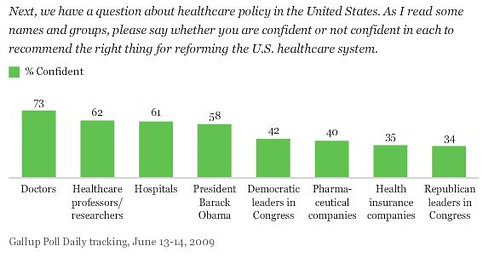Joining Big Pharma and the insurance industry, the AMA
announced it is opposed to public health insurance.
"The A.M.A. does not believe that creating a public health insurance option for non-disabled individuals under age 65 is the best way to expand health insurance coverage and lower costs," read an organizational statement to the Senate Finance Committee. "The introduction of a new public plan threatens to restrict patient choice by driving out private insurers, which currently provide coverage for nearly 70 percent of Americans."
Aside from the fact that public plans do not restrict patient choice, this isn't the first time the AMA (which
ranks second only to the U.S. Chamber of Commerce over the last ten years in the amount it has spent to influence Congress) has
spoken out against public health insurance.
Forty years ago, the AMA declared its opposition to creating a public health insurance option people over age 65, complete with dire predictions of the destruction of American medicine.
Going back
further, the "AMA has fought almost every major effort at health care reform of the past 70 years."
The group's reputation on this matter is so notorious that historians pinpoint it with creating the ominous sounding phrase "socialized medicine" in the early decades of the 1900s.
"The AMA used it to mean any kind of proposal that involved an increased role for the government in the health care system," Jonathan Oberlander, a professor of health policy at the University of North Carolina, told NPR in a 2007 interview. "They also used it to mean things in the private system that they didn't like. So, at one point, HMOs were a form of socialized medicine."
Their latest opposition is based on the belief that
without private insurers in the market, "the corresponding surge in public plan participation would likely lead to an explosion of costs that would need to be absorbed by taxpayers." Critics
disagree:
Indeed, in mid-February, the Commonwealth Fund put out a report on the most cost-effective ways to revamp the health care industry. The public plan, it concluded, "plays a central role in harnessing markets for positive change" by lowering premiums for many Americans by, potentially, $1,000 a year. In addition, the Commonwealth Fund added, a public plan would help decrease the number of uninsured in the country from "an estimated 48 million in 2009 (16 percent of the U.S. population) to 4 million by 2012."
Will the AMA's opposition carry any weight with Obama or Congress? This
doctor says the AMA is no longer the force in American medicine that it was in the past.
In the 1960's, at the height of opposition to Medicare, the AMA claimed at least 70 percent of American doctors as members. Today, the AMA represents only a third of American doctors, most of them elderly. Almost 90 percent of doctors over age of 70 are members, but fewer than 35 percent of those aged 30 to 49 belong to the AMA.
They're also
out-of-step with more than half of the of U.S. doctors who now
favor switching to a national health care plan, as well the 67 percent of Americans who
support creating a government-administered public health insurance option similar to Medicare to compete with private plans.
Don't cave to special interest groups like the AMA, Washington. Instead, take to heart
the words of Dr. Marcia Angell who spoke before the House HELP Committee earlier this week.
I want to mention one final and very important reason for enacting a nonprofit single-payer health program. We live in a country that tolerates enormous and growing disparities in income, material possessions, and social privilege. That may be an inevitable consequence of a free market economy. But those disparities should not extend to denying some of our citizens certain essential services because of their income or social status.
One of those services is health care. Others are education, clean water and air, equal justice, and protection from crime, all of which we already acknowledge are public responsibilities. We need to acknowledge the same thing for health care. Providing these essential services to all Americans, regardless of who they are, marks a decent and cohesive society. It says that when it comes to vital needs, we are one nation, not 300 million individuals competing with one another.
The special interests opposing public health insurance are motivated by money and profits. There are some things more important in life than money, and health care is one of them.

